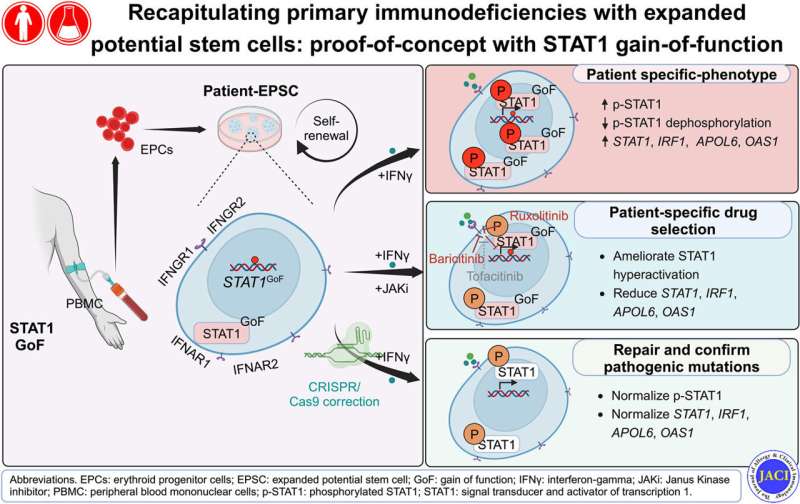This article has been reviewed according to Science X's editorial process and policies. Editors have highlighted the following attributes while ensuring the content's credibility:
fact-checked
peer-reviewed publication
trusted source
proofread
New stem cell model can help personalize stem cell treatment for immunodeficiency patients

A collaborative research team has pioneered a new stem cell model to help personalize treatment for patients suffering from rare forms of immunodeficiency. The research findings were published in the Journal of Allergy and Clinical Immunology.
Primary immunodeficiencies, also known as "inborn errors of immunity," are debilitating diseases that compromise the immune system, leaving patients highly vulnerable to infections, autoimmunity, and even cancer. To date, about 500 primary immunodeficiencies are known, but the list is growing yearly as new diseases emerge.
Although individually rare, the overall incidence of primary immunodeficiency is estimated at 1 in 10,000 individuals. Many of these diseases are also caused by genetic mutations and can be inherited across generations.
Owing to their rarity, a significant number of immunodeficiencies remain underdiagnosed and undertreated. Patients with these diseases often lack specific treatment options and receive suboptimal management, leading to a tremendous burden on patients and their families.
One example is a rare disorder called STAT1-Gain-of-Function (STAT1-GoF) disease. Patients with STAT1-GoF are born with an inheritable defect in their immune system, making them susceptible to life-threatening infections, autoimmune disorders, aneurysms, and cancers.
Collaborating with partners at the Centre for Translational Stem Cell Biology (CTSCB) and the University of Cambridge, HKUMed has pioneered a new stem cell platform to help patients with primary immunodeficiencies.
The research team led by Dr. Philip Li Hei, Professors Liu Pengtao, and Chak-sing Lau from the LKS Faculty of Medicine of the University of Hong Kong (HKUMed) took blood samples from patients and re-engineered the patients' cells into Expanded Potential Stem Cells (EPSCs), which can be used as personalized disease models, enabling various therapies to be tested to identify the most effective and safest treatment options without causing unnecessary risk to the patients.
The team has had remarkable success in identifying and repurposing drugs initially used to treat rheumatological conditions to treat individual STAT1-GoF patients in Hong Kong. The team's stem cell platform has demonstrated curative potential of individualized gene therapy for these conditions.
"Using our innovative platform, we successfully identified safe, effective and novel treatment options for individuals with rare immunological diseases," said Dr. Hei, division chief of Rheumatology And Clinical Immunology, and clinical assistant professor, Department of Medicine, School of Clinical Medicine, HKUMed.
"The capability to repurpose existing medications and explore their potential for gene therapy brings tremendous hope to both medical professionals and patients—as many of these orphan diseases were once thought to be untreatable or incurable."
"This study underscores the importance of collaborative research and the partnership among patients, doctors, and scientists," added Professor Pengtao, professor of the School of Biomedical Sciences and managing director of the Centre for Translational Stem Cell Biology at HKUMed.
CTSCB, supported by the InnoHK flagship program under the Innovation and Technology Commission of the HKSAR Government, aims to develop world-leading new stem cells from state-of-the-art technology. Professor Liu said that this novel stem cell platform has the potential to extend beyond a specific disease or patient, encompassing other inheritable conditions. They have already expanded this platform to study other rare immunological diseases, so hopefully, this is merely the beginning of an extraordinary journey.
Professor Lau, dean of medicine and chair of Rheumatology and Clinical Immunology, Department of Medicine, School of Clinical Medicine, HKUMed, said, "Patients with immunodeficiencies and other rare diseases are often underprivileged in Hong Kong. Delays in diagnoses and inadequate support for expensive diagnostic tests or treatments are common, putting the lives of these patients at risk."
"With the advent of new treatments, we also urge raising disease awareness, ensuring timely intervention, and providing robust support for immunodeficiency patients in the future."
More information: Xueyan Liu et al, Recapitulating primary immunodeficiencies with expanded potential stem cells: Proof of concept with STAT1 gain of function, Journal of Allergy and Clinical Immunology (2023). DOI: 10.1016/j.jaci.2023.11.914



















